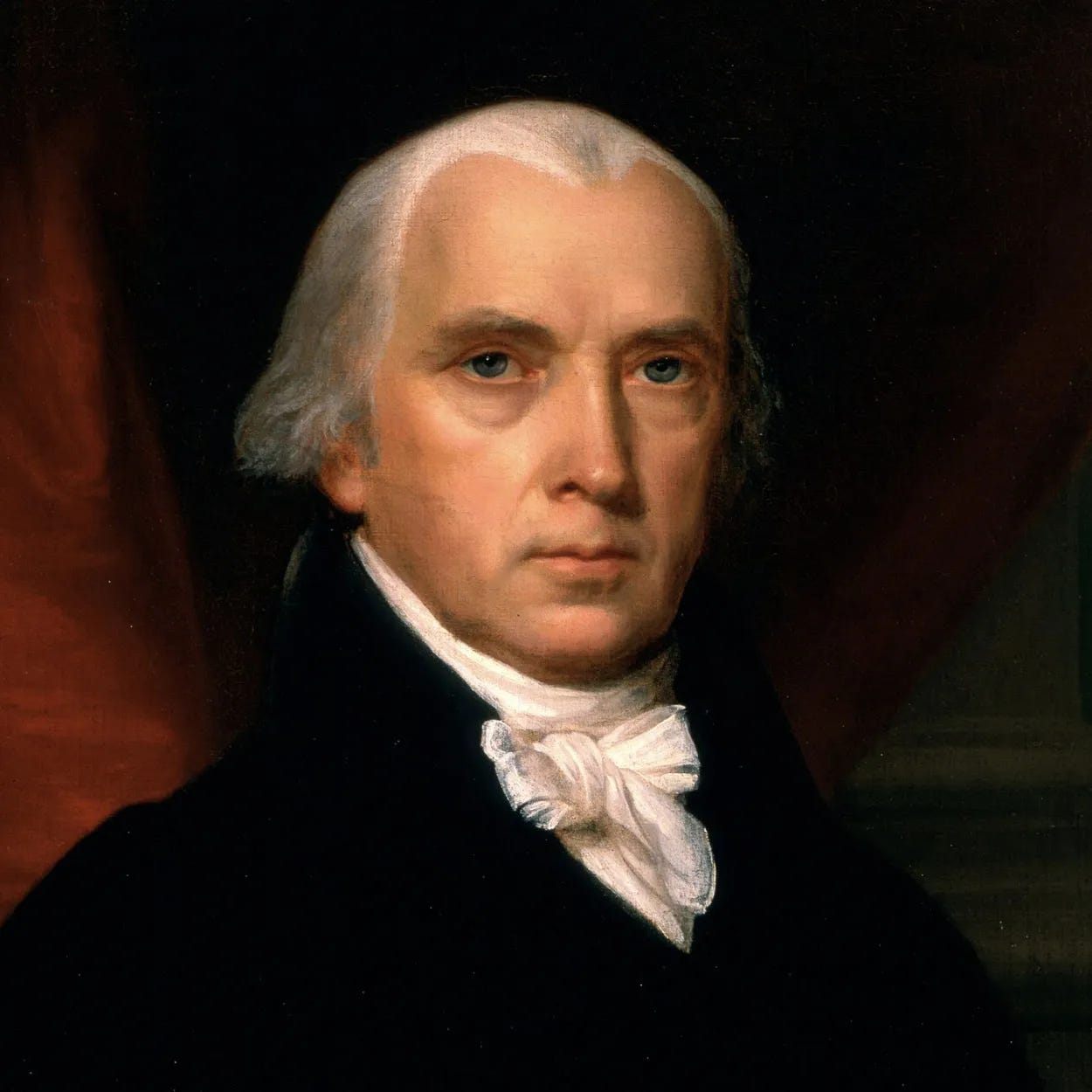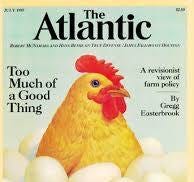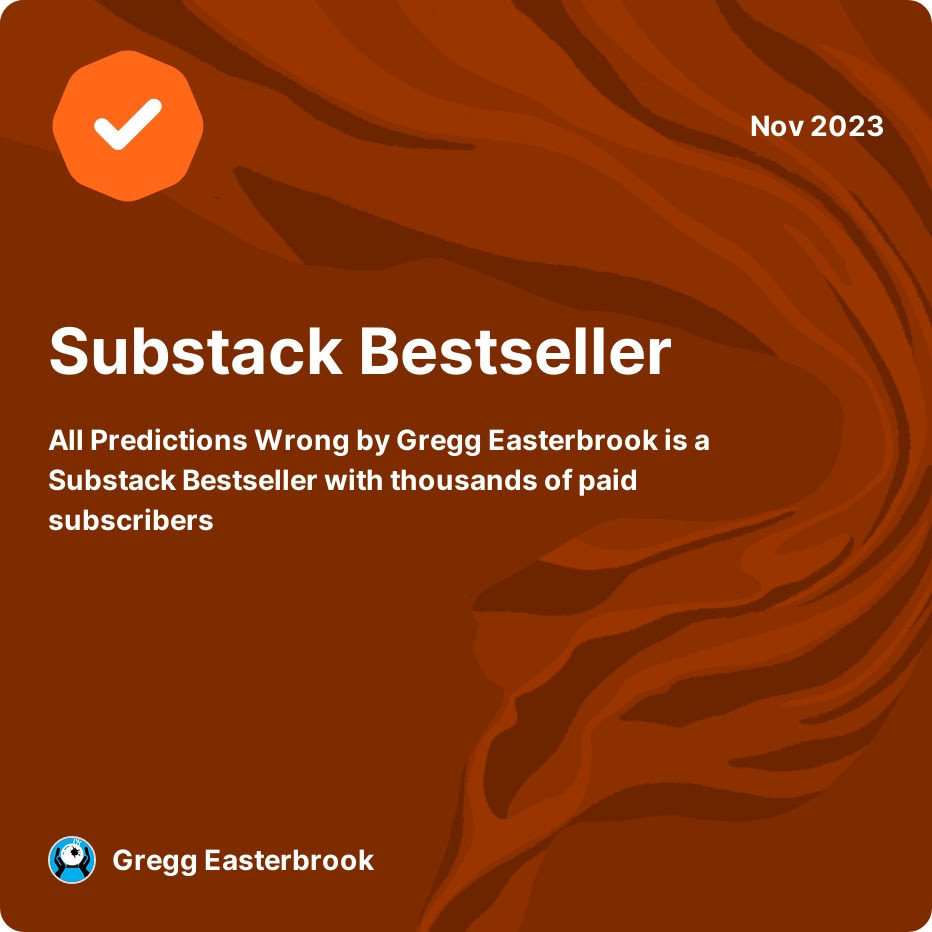Free speech is the worst policy, except for all other policies
To have freedom of thought, we must accept that sometimes awful people will say awful things
The 1963 Kurt Vonnegut novel Cat’s Cradle, an exemplar of science fiction as social commentary, concerns a man who creates a religion called Bokononism, complete with theology, ecclesiology and fancified words. To make the faith popular, the protagonist gets Bokononism banned. Suddenly everyone’s interested.
This is the core practical question of free speech. There are always people saying offensive or factually untrue things. You can argue against them or you can ignore them. (Ignoring is often most effective.) But if you ban their speech, crackpot and hateful stuff is glamorized.
That’s the practical question. The legal question is secondary.
Note: in a moment I will get to bizarre attempt by The Atlantic, one of the finest and most important publications ever, to destroy the young independent Substack.
To place myself in perspective, I’ve been on The Atlantic’s masthead for most of my adult life: as staff writer, contributing editor or national correspondent. I love The Atlantic and always will.
I’ve published eight Atlantic cover stories and 27 other Atlantic articles, totaling around 200,000 words, the length of three books. I have spent many, many hours in The Atlantic’s offices in Boston and Washington.
In 2017, I was inducted into the American Academy of Arts and Sciences along with David Bradley, then Atlantic’s owner.
I feel this makes me qualified to comment on matters regarding The Atlantic. More later.
On the legal side, the First Amendment speech clause – “Congress shall make no law… abridging the freedom of speech or of the press” – prevents government agencies and state actors, such as colleges that receive public subsidies, from prior restraint. Via Supreme Court decisions, “Congress” is now understood also to mean lawmaking bodies of states, cities and counties.

Private companies and organizations can restrain speech, government can’t. That is the theory anyway. There are violations in both directions.
James Madison, who wrote the First Amendment, took the practical path. Madison believed nearly all forms of political, religious, artistic and scientific expression should be protected, even knowing this would open the door to creeps and cretins. As president, Madison refused to crack down on criticism of his administration, saying he would rather refute than censor.
Better to argue against awful speech – or to ignore – than to gag, which only brings new converts to Bokononism.
In Madison’s time, ideas were advanced by pamphlets, newspapers, speeches (heard in person) or theatrical performances. Serious plays have had political subtexts since the Greeks.
Soon books, magazines, radio and television joined the fun, as did recorded speeches and albums of political comedy. Download some Mort Sahl or Lenny Bruce standup!
The Internet offers many new ways in which to transmit ideas and political claims, including the fake and the offensive, using the small and almost supernaturally effective globally linked computers we carry.
It’s far from settled what the legal status is for social media and other computer-based platforms. The Supreme Court recently heard arguments regarding computer services banning forms of expression. A decision is expected in the current term.
There’s running debate in legal and legislative circles, sometimes linked to the wonderfully named Communications Decency Act of 1996, about whether Internet platforms are like publishers (in which case they can pick and choose what to allow, then can be sued over their choices) or like utilities (in which case they generally must treat all the same, but are mostly immune from lawsuits).
The Fifth Circuit federal appeals court, based in New Orleans, recently ruled that computer services are like utilities, and so cannot remove (or refuse) content for political reasons. That you must say something is the free-speech mirror of you can’t say something.
In a Supreme Court hearing last fall, Solicitor General Elizabeth Prelogar (fun fact: former Miss Idaho!) opposed the Fifth Circuit, arguing, “The act of culling and curating the content users see is inherently expressive… a government requirement that [services] display different content… plainly implicates the First Amendment.” That is to say, the Biden Administration thinks computer services are like publishers, free to run or not run content as they see fit.
The Solicitor General and her deputies present executive branch positions to the Supreme Court.
The political subtext of last autumn’s case was the Fifth Circuit wanted to force computer services to promote conservative viewpoints. The White House wanted computer services to ignore conservatives.
Even if the Supreme Court settles the debate on what platforms are, communications technology evolves so fast it won’t be long till we are wringing our hands about some new tech nobody saw coming.
Elizabeth Prelogar. Photo courtesy Justice Department.
Prior developments in communications have been disruptive.
Movable type made scribes furious. Charles Dickens thought the arrival of inexpensive printing presses would put authors out of business. Development of sheet music, then of the phonograph, deeply upset composers and performers. Affordable radios were said to be a huge threat to democracy because they would amplify demagogues, and did in 1930s Germany, though later were mainly about Top 40 music. Television was going to turn our brains into oatmeal. (Hmmm – maybe.) VCRs then streaming were going to put television out to pasture. Now social-media algorithms mass-market anxiety and anger. Lord knows what’s coming down the tech pike.
Deepfakes and AGI fabrications soon will be all around us. “Soon” in this context means, “November 2024 election.”
The horribleness of Trump, and the fact that in 2020 he was endorsed by 74 million voters, is being used to justify speech restrictions in many areas.
The saying aux grands maux, les grands remèdes does not apply here, as institutionalizing the silencing of speech is a cure worse than Trump disease.
These considerations make me think free speech absolutism, which has many faults, must be maintained because all other approaches lead to places we don’t want to go.
Even the First Amendment places some restrictions on expression. It does not protect threats of violence, advocacy of crime, libel, or theft of intellectual property. But clearly does protect meanness, absurd claims, lies, racist, sexist, fascist and other outrageous statements.
James Madison. Library of Congress image.
This is the price we pay for liberty – and a much lower price than we’d pay if the censors had their way.
Free speech goes hand-in-hand with freedom of thought. Today the hard left and far right alike want to prohibit freethinking. It’s your thoughts – more than your votes – both fear.
The evolution of the ACLU, from defender of free thought to defender of speech codes, is an example.
Read the transcript of the 1925 Scopes Trial. (Very different from the distortion of Inherit the Wind.) The ACLU’s Arthur Hays does a great job advocating free thought. Check the rousing speech by his fellow lawyer Dudley Malone, who thundered, “We stand with progress. We stand with science. We stand with fundamental freedom, and we are not afraid!”
The ACLU team was defending biology against religious dogma. Today the ACLU would want Dudley Malone cancelled, because he backed biology over ideology.
The desire on the left to suppress biology is an instance of why freedom of speech must extend to science as well as politics and art.
William Jennings Bryan at the Scopes trial. Library of Congress photo.
When science was finding same-sex attraction occurs naturally, the right wanted that knowledge forbidden. Now science shows almost everyone is either male or female -- social roles for gender are another matter – and the left wants this to be a forbidden thought.
Harvard recently drummed out an accomplished evolutionary biologist.
Her sin was declaring male and female are tangible categories established by nature.
Charles Darwin’s 1859 book Origin of Species, laying out evolution and discrediting religious explanations, would be praised by Harvard today. His 1871 book Descent of Man, showing male and female are determined by biology in order to allow natural selection, might be banned by Harvard. To protect the freedom of thought in Origin of Species, we must also protect Descent of Man.
Protecting free speech (political, scientific, literary and artistic) means allowing Donald Trump to rave about vermin and poisoned native blood. It means allowing neo-Nazis to parade in Skokie, Illinois. (Check 1977.) It meant, for a while, allowing white supremacist opinions on Substack -- though a tiny number, just like the Skokie marchers.
True free speech results in outcomes no decent person likes. But all other approaches are worse – and subject to manipulation by evolving tech.
Government, or Google, cannot know what books you are reading. Increasingly, government and the tech sector do know what you’re reading or listening to on the Web, and where you are when you do it.
There is just one defense against this – free speech, even knowing awful people will say awful things.
By the same token there must be freedom of thought, even knowing awful people will think awful thoughts.
Many who want to create a Thought Police, or to enforce ideological groupthink, assert they are doing so in the interest of society, or the interest of education.
But as Dudley Malone, 1882-1950, said back when the ACLU actually supported civil liberties, “I never learned anything from someone I already agree with.”
Society needs to hear dissent. Students need to hear ideas and information that make them uncomfortable. All of us need our assumptions challenged. Without free speech, this does not happen.
There simply is not any formula for restricting speech that cannot be twisted around to block political and artistic expression -- to block criticism of the party in power, block criticism of university, business and religious leaders, prevent writers and artists from expression.
This was seen in the Twitter Files disclosures of federal agencies working with the pre-Musk Twitter and with Facebook to suppress criticism of government officials. This was seen again in 2022 when the Biden Administration created a Disinformation Governance Board that was supposed to crack down on “disinformation,” which means anything the party in power didn’t like.
The board has since been disbanded. Here is a humor piece that covered the situation more honestly than the MSM did.
We live in a time when the mainstream media favor government suppression of information – all the more reason to emphasize freedom of speech.
The desire to suppress speech was seen again after the Discord leaks of Pentagon documents. Joe Biden made comments about wanting legal authority to control what’s published on the Web. We all know where this would lead.
Almost everything must be allowed, then argued against or ignored. James Madison came to that conclusion in 1789. He was right then and he’s right today.
Even the most carefully worded speech restriction schemes can be abused, for instance by defining academic disagreements as “extremism” or differences of political opinion as “hate speech.”
Many current efforts at censorship boil down to, I hate what you just said, so that makes what you said hate speech.
Substack and free speech.
If platforms are more like publishers than utilities, they can simply decline to publish content. Newspapers, magazines and book publishers do this every day. If platforms decline of their own accord, that’s fine.
Nobody can find Bigfoot — or the Nazis supposedly running wild on Substack.
Many know that in November, The Atlantic accused Substack of harboring white supremacist content. The alleged neo-Nazi areas of Substack turned out to be harder to find than Sasquatch.
The Atlantic article contained substantial fabrication and altered quotations
plus a fake claim great wealth was being attained by “nazis” through Substack, when no newsletter The Atlantic objected to had paid subscribers.
Nonetheless several Substack authors theatrically departed, using the opportunity for publicity stunts. I barely escaped from Nazis! Even though I couldn’t actually find any! Admire me!
Best of luck to all.
When the controversy began Hamish McKenzie, one of Substack’s founders, said, “We wish no one held Nazi views. But some people do hold those and other extreme views. We don’t think censorship makes the problem go away: in fact, makes it worse. Subjecting ideas to open discourse is the best way to strip bad ideas of their power.”
Virtue-signalers feigned outrage at this statement, which was pure James Madison.
Last week McKenzie decided to enforce existing Substack terms of service in a manner that banished the tiny amount of content that could be characterized as National Socialist. This concluded the controversy with Substack acting of its own accord, not being compelled, which is as it should be.
Please don’t tell Ralph Waldo Emerson about The Atlantic of today.
The Atlantic doubled down, declaring Substack in “crisis.” Another Sasquatch! No crisis has manifested in anyone’s readership, which is what Substack is all about.
The Washington Post detected a “revolt” somehow unknown to writers and readers of Substack.
The Post and The Atlantic want Substack perceived as bad, for these reasons:
1) Both prefer bad news. As if there’s isn’t enough actual bad news, both are happy to invent some.
2). Substack is a competitor. Trying to destroy a competitor is a common business practice.
In this case, by maneuvering the word “Nazi” into the results box for search submissions of the word “Substack.” Both The Atlantic and the Washington Post had “nazi” in their headlines. The “nazi” claim was not backed by even one scrap of evidence – but headlines are what search engines scan.
3). The Washington Post and Atlantic have conflicts of interest involving advertisers and corporate-funded networking events that lease their brands. These publications are embarrassed that Substack, which does not accept advertising, has no conflicts of interest. So they needed to invent a sin to accuse Substack of.
4). Substack offers many lefty viewpoints, including pro-Palestinian Council Estate Media (in United Kingdom slang a “council estate” is a public housing project). Lefty views on Substack were fine by the MSM. The New York Times and Washington Post became outraged when, in addition to lefty views, Substack hosted successful conservative arenas including the Free Press, the Dispatch, the Bulwark and Public.
Public has been on the case of government attempts to conceal censorship of political expression
and yesterday said, “Falsely painting alternative media as Nazi-aligned is anticompetitive behavior aimed at reducing the threat Substack poses to legacy media.”
Mainstream conservative destinations on Substack, such as Free Press, are civil, carefully researched, and employ intellectual reasoning. This drives The Atlantic and the Washington Post to distraction, disrupting their preferred narratives that conservative views are held only by rude crazy people. Who must be silenced!
5). The Atlantic, especially, is jealous of Substack.
Both The Atlantic and Substack contain high-quality writing on a range of topics. Both serve their readers well with news, analysis and literature.
But Substack is making money, unlike The Atlantic, which exists at the pleasure of wealthy patrons.
Substack has become a peer to The Atlantic in the world of letters while making money, which the much older publication, for all its laurels, can’t seem to figure out.
And why is Substack making money? Readers like it.
Back to The Atlantic. Of my roughly 200,000 words there, no sentence of mine had to be retracted, a testament to the rigor of the old Atlantic, where the fact-checking department’s word was law.
Recently Atlantic‘s work has been slipshod. Chic agitprop seems to rule.
This is not wearing well on a 167-year legacy. Yours truly is not alone in being an Atlantic-lover who is worried.
Bonus: Substack’s Other Sin. There is another factor at play as regards free speech and Substack specifically, though not at play as regards free speech and academia, politics or corporate DEI.
Substack doesn’t have an editor in chief. It doesn’t have a managing editor. It doesn’t hand out assignments, doesn’t spike stories and doesn’t use the red pencil on drafts.
Writers make all the decisions about what should or should not run -- and of course, sometimes are wrong. Substack is a world ruled by writers, and not even the New Yorker can say that.
Substack is the greatest thing to happen to writers in this generation. The greatest thing to happen to readers, too. Readers not only get quality work at a fair price, readers’ voices are heard in a way that just does not happen with the MSM.
High-ranking newspaper, magazine and book-house editors really don’t like any of this.
They sense their special status as gatekeepers is slipping away. Rather than get their own houses in order, they want to harm the unwelcome competition.
Top editors have many virtues but in some respects are an intercessionary priesthood between writer and reader. That’s changing, and readers are the beneficiaries.
About All Predictions Wrong
All Predictions Wrong has received a Substack bestseller badge. Thanks to all!
Please pass the word. Substack is an independent, not a corporate colossus, and does not accept advertising. Word-of-mouth is the key to a Substack project.
From now till that Super Bowl thing you might have heard about, on Tuesday this space will be Tuesday Morning Quarterback, on Friday will be All Predictions Wrong on some topic other than sports. After that Super Bowl thing, this space will revert to entirely All Predictions Wrong.
A subscription to All Predictions Wrong includes Tuesday Morning Quarterback, so it’s two-for-one.










I'm with Jake, I hate Illinois nazis. Great piece as always. I trend more liberal as I get older but I also need alternative perspectives to make sure what's really true as opposed to hype. My go-to source for alternative takes, Fox News (who are MSM despite protestations to the contrary), has been hijacked by headline writers with a severe lack of substance behind the bold type. On the flip side I've given up MSNBC for the same reasons. But journalism has always been slanted to one view or another, and free speech is the cure as it has always been. To my children and anyone else who will listen, I say read always, and read broadly. It breeds curiosity, and curiosity is good for humanity
I’ve been reading The Atlantic since 1964 (as a teenager I worked in a public library and had access to what seemed like EVERYTHING), subscribed in college and read it regularly through the 70s. I’ve read it less over the years but still pick it up occasionally. I too am concerned by the level of agitprop but still pick it up hoping the quality of the wring outweighs the ideology. It’s like Dr. Johnson’s definition of a second marriage.
Of more concern were the number of writers who immediately left, or polled their readers to see if they should leave, before Singal’s piece was published. How come none of these writers asked the questions that Singal asked? Have we reached the point where the fear of being associated, even peripherally, with a banned thought makes critical thinking impossible? THAT is the really scary part, that fear of the mob leads to self censorship.